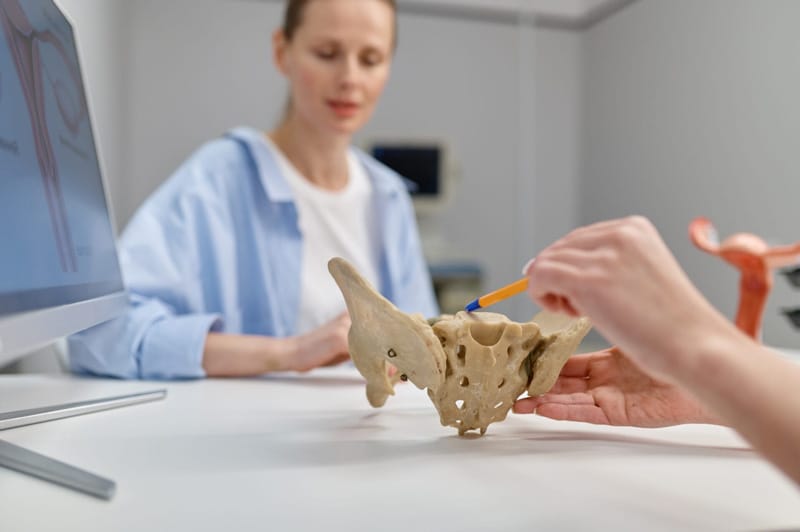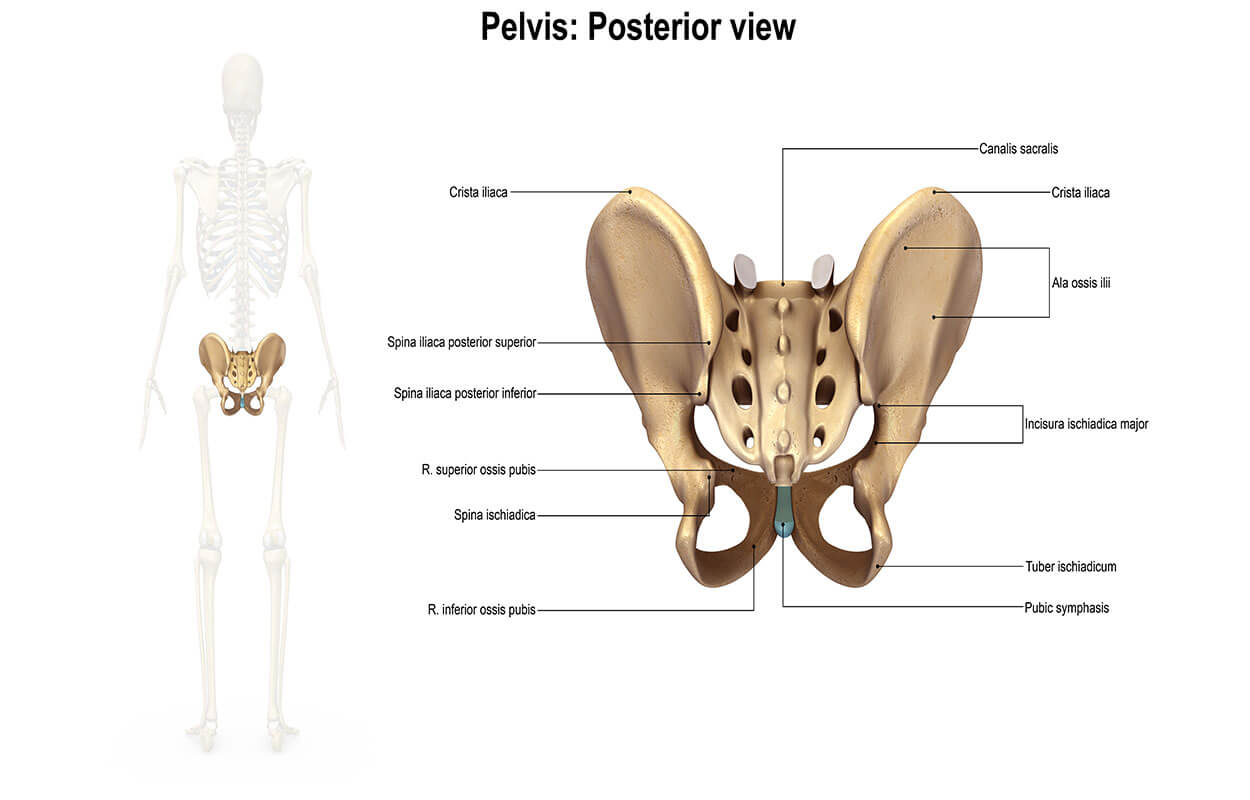
Why Pelvic Health Physiotherapy
Pelvic Health concerns are far too frequent and hardly ever spoken about. Our team of registered physiotherapists who specialize in pelvic health understand that pelvic health concerns can be a source of discomfort, frustration, and even embarrassment. Many men and women go through it silently without knowing that there are practical, evidence-based treatment methods available. We want to help bridge the gap for patients in Bloor West Village, Oakville and Toronto to find a Registered Physiotherapist that has the post graduate certifications and training to improve their quality of life. Our physiotherapists at PhysioDNA are certified in Pelvic Health Physiotherapy which can include internal or external examinations of the pelvic area depending on the individual client.
What is Pelvic Health Physiotherapy?
Pelvic health physiotherapy is a specialized branch of physiotherapy that focuses on the muscles, ligaments, and nerves of the pelvic floor. This area plays a crucial role in various bodily functions, including:
- Urinary control: Pelvic floor muscles help maintain bladder control and prevent incontinence.
- Bowel function: These muscles contribute to proper bowel control and stool consistency.
- Sexual health: Pelvic floor strength and flexibility are essential for sexual function in both men and women.
- Core stability: the pelvic floor is part of the ‘inner unit’ of muscles that work alongside your core to support your spine and posture.
Pelvic health physiotherapy can address a wide range of conditions, including:
- Urinary incontinence: Leaking urine during coughing, sneezing, or exercise.
- Pelvic organ prolapse: When pelvic organs (bladder, uterus, rectum) descend from their normal position.
- Pelvic pain: Pain in the lower abdomen, genitals, or lower back related to pelvic floor dysfunction.
- Painful sexual intercourse: Discomfort or pain during sex due to tight or weak pelvic floor muscles.
- Diastasis recti: Separation of the abdominal muscles after pregnancy.
- Postpartum recovery: Strengthening and retraining pelvic floor muscles after childbirth.
- Pelvic floor dysfunction in men: Urinary incontinence, erectile dysfunction, and pelvic pain.
How can pelvic health physiotherapy help?
Our pelvic health physiotherapists will conduct a thorough assessment to understand your specific needs and concerns. It can reduce pain, improve bowel and bladder control, improve core stability and posture, increase confidence, and enhance sexual function.
Pelvic physiotherapy treatment may include:
- Pelvic floor muscle exercises: Learning to contract, relax, and coordinate your pelvic floor muscles for improved function.
- Manual therapy: Techniques like internal or external massage to address muscle tension and trigger points.
- Biofeedback: Using visual cues to help you become more aware of and control your pelvic floor muscle activity.
- Lifestyle modifications: Education on bladder and bowel habits, posture, and exercises to support pelvic health.

We offer a discreet and supportive environment where you can feel comfortable discussing your concerns. Book a pelvic physiotherapy session in Bloor West Village, Oakville, or downtown Toronto to take control of your pelvic health today.
What is Pelvic Health Physiotherapy?
Pelvic health physiotherapy is a specialized branch of physiotherapy that focuses on the muscles, ligaments, and nerves of the pelvic floor. This area plays a crucial role in various bodily functions, including:
- Urinary control: Pelvic floor muscles help maintain bladder control and prevent incontinence.
- Bowel function: These muscles contribute to proper bowel control and stool consistency.
- Sexual health: Pelvic floor strength and flexibility are essential for sexual function in both men and women.
- Core stability: the pelvic floor is part of the ‘inner unit’ of muscles that work alongside your core to support your spine and posture.
Pelvic health physiotherapy can address a wide range of conditions, including:
- Urinary incontinence: Leaking urine during coughing, sneezing, or exercise.
- Pelvic organ prolapse: When pelvic organs (bladder, uterus, rectum) descend from their normal position.
- Pelvic pain: Pain in the lower abdomen, genitals, or lower back related to pelvic floor dysfunction.
- Painful sexual intercourse: Discomfort or pain during sex due to tight or weak pelvic floor muscles.
- Diastasis recti: Separation of the abdominal muscles after pregnancy.
- Postpartum recovery: Strengthening and retraining pelvic floor muscles after childbirth.
- Pelvic floor dysfunction in men: Urinary incontinence, erectile dysfunction, and pelvic pain.
How can pelvic health physiotherapy help?
Our pelvic health physiotherapists will conduct a thorough assessment to understand your specific needs and concerns. It can reduce pain, improve bowel and bladder control, improve core stability and posture, increase confidence, and enhance sexual function.
Pelvic physiotherapy treatment may include:
- Pelvic floor muscle exercises: Learning to contract, relax, and coordinate your pelvic floor muscles for improved function.
- Manual therapy: Techniques like internal or external massage to address muscle tension and trigger points.
- Biofeedback: Using visual cues to help you become more aware of and control your pelvic floor muscle activity.
- Lifestyle modifications: Education on bladder and bowel habits, posture, and exercises to support pelvic health.

We offer a discreet and supportive environment where you can feel comfortable discussing your concerns. Book a pelvic physiotherapy session in Bloor West Village, Oakville, or downtown Toronto to take control of your pelvic health today.
I have no issue with my pelvic floor, is it still beneficial to see a Pelvic Floor Physiotherapist?
It is very common for a person to come see a Pelvic Physiotherapist as a proactive and prevention approach to avoid issues from occurring in the future. For example a woman that is planning on becoming pregnant may want to get a Pelvic assessment done to see what the strength of her pelvic muscles is and to also learn how to control and activate her pelvic floor (as this is an area that can become weak postpartum). A pelvic assessment provides a wealth of knowledge for the individual. For example, it can provide detailed insights on the working of your pelvic floor and the ability (or inability) to control these muscles from an internal control perspective. Inability to control and use these muscles may not show direct symptoms on a day to day basis, however over time can be an indicator that something may become an issue in the near future. Education and understanding your own body is a crucial part to the pelvic assessment. Our sessions are not rushed and are aimed at understanding your body and concerns and working with you to find answers and solutions that fit your life and lifestyle.
Do I need to get an internal assessment of my pelvic floor?
Internal assessments are traditionally part of the initial pelvic assessment however if this is something you are not comfortable with, do not worry, the therapist can still have a very in depth assessment without it. Our Pelvic Therapist is able to still provide a comprehensive assessment and key follow up insights.
Unsure if you need to see a Pelvic specialist? Give us a call and we are happy to guide you and also offer a complimentary consultation with our experts to ensure you are seeing the right expert or to get more detailed information on what to expect.
Related Blogs
FAQs
-
What can I expect during my first pelvic health physiotherapy appointment?
Your pelvic floor, SI joints, abdominal and thigh connective tissue, and lower back may all be evaluated during the physical examination for pelvic health physiotherapy. A pelvic floor evaluation includes evaluating the strength of the pelvic floor as well as doing an interior exam to search for trigger points.
-
Are there any specific exercises or techniques used in pelvic health physiotherapy?
Kegel and breathing exercises are two of the more focused exercises in pelvic health physiotherapy, as they help your body release more stress than most other exercises. Your therapist may also provide you with a routine to work with, depending on your physical condition and requirements.
-
How long does a typical pelvic health physiotherapy session last?
A pelvic health physiotherapy session’s duration varies based on the patient’s condition and course of treatment. For first assessments, sessions often last 60 minutes, and for follow-up consultations, they typically run 30 to 60 minutes.
-
What qualifications should I look for in a pelvic health physiotherapist?
Look for a pelvic health physiotherapist with specialized training in pelvic health physiotherapy, experience in treating pelvic conditions, strong communication skills, and appropriate certification in women’s or pelvic health.
-
How many sessions of pelvic health physiotherapy will I need to see improvement?
It’s important to remember that pelvic health physiotherapy programs are extremely customized and based on the particular requirements and objectives of every patient. There are only so many solutions that work for everyone, but a standard plan can include four to nine appointments.







